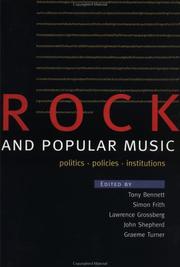| Listing 1 - 3 of 3 |
Sort by
|
Book
ISBN: 1846949254 Year: 2011 Publisher: Lanham : O-Books,
Abstract | Keywords | Export | Availability | Bookmark
 Loading...
Loading...Choose an application
- Reference Manager
- EndNote
- RefWorks (Direct export to RefWorks)
In the last few decades, new technologies have brought composers and listeners to the brink of an era of limitless musical possibility. They stand before a vast ocean of creative potential, in which any sounds imaginable can be synthesised and pieced together into radical new styles and forms of music-making. But are musicians taking advantage of this potential? How could we go about creating and listening to new music, and why should we? Bringing the ideas of twentieth-century avant-garde composers Arnold Schoenberg and John Cage to their ultimate conclusion, Infin

ISBN: 0415063698 9780415063692 041506368X Year: 1993 Publisher: London: Routledge,
Abstract | Keywords | Export | Availability | Bookmark
 Loading...
Loading...Choose an application
- Reference Manager
- EndNote
- RefWorks (Direct export to RefWorks)
Rock music --- Popular music --- Political aspects --- Social aspects --- Political aspects. --- Social aspects. --- 316.7:78 --- 78.067.26.4 --- 78 "19" --- -Rock music --- -Popular music --- -Music and society --- #SBIB:309H142 --- Music and society --- 78.067.26.4 Beatmuziek. Discomuziek. Popmuziek. Rockmuziek --- Beatmuziek. Discomuziek. Popmuziek. Rockmuziek --- 316.7:78 Sociologie van de muziek --- Sociologie van de muziek --- Music, Popular --- Music, Popular (Songs, etc.) --- Pop music --- Popular songs --- Popular vocal music --- Songs, Popular --- Vocal music, Popular --- Music --- Cover versions --- Rock and roll music --- Rock-n-roll music --- 78 "19" Muziek--20e eeuw. Periode 1900-1999 --- Muziek--20e eeuw. Periode 1900-1999 --- Populaire muziek: functies, muziekgenres, historiek --- Rock (Musique) --- Musique populaire --- Aspect politique --- Aspect social --- departement PHL Music 08 --- rockmuziek --- muziek en maatschappij --- muziek en politiek --- Rock music - Political aspects --- Rock music - Social aspects --- Popular music - Political aspects --- Popular music - Social aspects
Book
ISBN: 0710313373 9780710313379 9780203886212 9781135784607 9781135784645 9781135784652 9780415592161 Year: 2009 Publisher: London Routledge
Abstract | Keywords | Export | Availability | Bookmark
 Loading...
Loading...Choose an application
- Reference Manager
- EndNote
- RefWorks (Direct export to RefWorks)
A Life Adrift, the memoir of balladeer-political activist Soeda Azembō (1872-1944), chronicles his life as one of Japan's first modern mass entertainers and imparts an understanding of how ordinary people experienced and accommodated the tumult of life in prewar Japan. Azembo created enka songs sung by tenant farmers in rural hinterlands and factory hands in Tokyo and Osaka. Although his work is still largely unknown outside Japan, his poems and lyrics were so well known at his career's peak that a single verse served as shorthand expressing popular attitudes about political corruption, sex scandals, spiralling prices, war, and love of motherland. As these categories attest, he embedded in his songs contemporary views on class conflict, gender relations, and racial attitudes toward international rivals. Ordinary people valued Azembo's music because it was of them and for them.
Composers --- Enka --- Popular music --- J2284.70 --- J6742 --- J6754 --- J6800.70 --- Music, Popular --- Music, Popular (Songs, etc.) --- Pop music --- Popular songs --- Popular vocal music --- Songs, Popular --- Vocal music, Popular --- Music --- Cover versions --- History and criticism --- Political aspects&delete& --- History --- Social aspects&delete& --- Japan: Genealogy and biography -- biographies -- kindai (1850s- ), bakumatsu, meiji, taishō --- Japan: Performing arts and entertainment -- music -- vocal music -- folk songs and popular songs --- Japan: Performing arts and entertainment -- music -- popular music --- Japan: Performing and media arts -- history -- Kindai (1850s- ), bakumatsu, Meiji, Taishō --- Soeda, Azenbō, --- Soeda, Heikichi, --- Soeda, Azembō, --- 添田亜蝉坊, --- 添田亞蝉坊, --- 添田亞蟬坊, --- 添田啞蟬坊, --- Soeda, Azenbō, 1872-1944. --- Popular music -- Social aspects -- Japan -- History. --- Popular music -- Political aspects -- Japan -- History. --- Composers -- Japan -- Biography. --- Enka -- History and criticism. --- Political aspects --- Social aspects --- Soeda, Azenbō
| Listing 1 - 3 of 3 |
Sort by
|

 Search
Search Feedback
Feedback About UniCat
About UniCat  Help
Help News
News